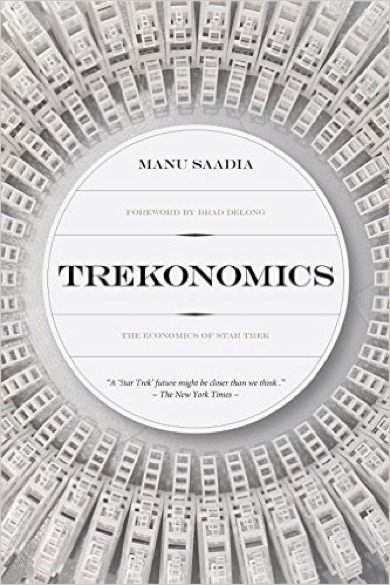This year marks the 50th anniversary of the hugely popular sci-fi franchise Star Trek — arguably one of the profoundly influential fictional series of the last century. It’s also the 500th anniversary of Sir Thomas More’s classic work, Utopia, offering his vision of an ideal society. For Manu Saadia, that’s a fitting coincidence: “The world of Star Trek is an economic Utopia.”
Live long and prosper. There’s a lot we can learn from the economics of “Star Trek,” according to a new book.
Saadia is the author of a new book, Trekonomics: The Economics of Star Trek, the first release from the new imprint Pipertext, founded by finance journalist Felix Salmon. Saadia uses this fictional world to explore a provocative question: What would the world look like if everybody had everything they wanted or needed?

A native of Paris, France, Saadia fell in love with science fiction in general, and Star Trek in particular, when he was eight years old. After studying the history of science and economics in both Paris and Chicago, he decided to leave academia and become a writer. But his passion for Star Trek has remained a constant. Spock’s signature greeting, “Live long and prosper,” was even incorporated into his wedding vows.
Hundreds of books have been written exploring every possible aspect of Star Trek, from the physics, religions and philosophy, to political science and history. But when Saadia tried to find a good analysis of the economics of this fictional world, he came up empty. So he decided to write the book he would want to read on that topic.
Part of the economics of this fictional world of the future no doubt stems from the ingenious technological innovations in the Star Trek universe, from the transporter and tricorder, to the holodeck and the crew’s handheld communicators — not to mention warp drive and antimatter-powered engines. Creator Gene Roddenberry often found inspiration in real-world science, and his fictional inventions inspired generations of scientists and engineers to create real-world versions of those 24th-century technologies.
But Saadia wanted to explore deeper questions about the underlying economic theory, not just market supply and demand. As he writes in his introduction to Trekonomics:
What really matters, and what makes Star Trek uniquely utopian, is the social distribution of these impressive technologies. What distinguishes the United Federation of Planets is not so much that they invented the replicators, these magical machines that can produce almost anything on demand, but rather that these replicators are free and available to all as public goods. Think about it this way: if the benefits of replicators, monetary or otherwise, only accrued to those who own and operate them, then Star Trek would not be Star Trek.
That’s not to say the world is perfect, though:
The world Star Trek built raises multiple economic problems. For instance, what happens to innovation and scientific progress without the hope of financial rewards? Similarly, how can a society where all is freely available avoid the tragedy of the commons, the trap of resource depletion caused by unchecked over-consumption? Star Trek does not shy away from these questions. Several episodes of the show deal openly with the challenges of organising and regulating its own utopia.
Frankly, as Saadia points out, the idea that machines would relieve human beings of the drudgery of work is a very old idea — dating back at least to the Industrial Revolution, if not further. We already have a certain degree of economic prosperity, for instance, it’s just not distributed evenly around the globe. And the notion of a minimum living wage for all is actually being discussed seriously in this year’s presidential election.
In that regard, “Star Trek‘s utopia is nothing more than the world that awaits us on the other side of that great social metamorphosis,” Saadia argues, “provided that we decide to distribute our newly acquired freedom evenly and that we avoid boiling our planet.”
[Whatever]
